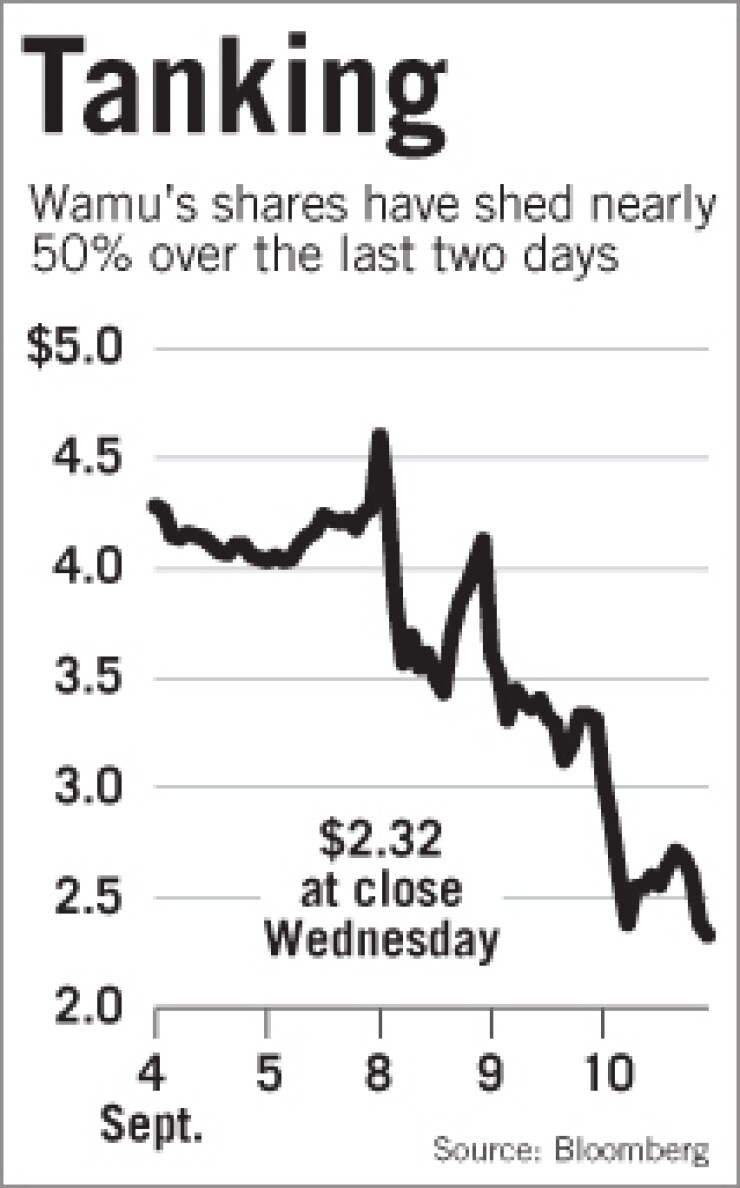
In the past three business days Washington Mutual Inc. has been hit with a regulatory enforcement order, a credit downgrade, the ouster of its longtime leader, and a sell-off by investors.
Can government assistance be far behind?
It is perhaps a sign of the times that some sort of intervention is on the minds of so many in both the analyst and policy communities.
"What's happening is, as each day passes and these events accumulate, the odds of an FDIC-assisted merger are increasing," an industry source said. It's "moving in that direction."
"I'm not sure what the more likely outcome is, but who would have said six months ago that conservatorship of Fannie and Freddie is the more likely outcome."
Because Wamu is the largest thrift in the country and a well-known name, regulators have plenty of motivation to help, Andrew M. Senchak, vice chairman and co-head of corporate finance at KBW Inc.'s Keefe, Bruyette & Woods Inc., said in an interview Wednesday.
However, Mr. Senchak said that help could occur largely behind the scenes.
"I'm sure that everybody involved will work hard so that the government doesn't have to spend its precious resources on this," he said.
James Barth, the Lowder Eminent Scholar in Finance at Auburn University and a former economist with the Office of Thrift Supervision, Wamu's primary regulator, said the company could be put into conservatorship and run by the government until a buyer is found.
"Obviously Washington Mutual is suffering a great deal," he said. "It's going to be OTS working with the FDIC deciding what to do … so once again it's in the hands of the regulator and the insurer to decide what to do."
Analysts and traders pointed out that, with its shares off 20% Tuesday and 30% Wednesday, investor confidence in Wamu as a stand-alone company is dwindling fast, and this may force it to make a move.
"You're seeing a lot of nervousness with them," Anthony Conroy, head trader at Bank of New York Mellon Corp.'s BNY ConvergEx Group, said in an interview Wednesday.
A Wamu spokesman did not return messages Wednesday.
Alan Fishman, who took over for Kerry Killinger as chief executive on Monday, is widely viewed as having few options to resuscitate the thrift company. Analysts note that Mr. Fishman, 62, has some experience selling thrifts — he was CEO of Independence Community Bank Corp. in Brooklyn, N.Y., when it was sold to Sovereign Bancorp of Philadelphia in 2006.
Wamu has been viewed as a willing seller for some time, having considered a deal with JPMorgan Chase & Co. in the spring. But no buyer stepped up with a firm bid and several investment bankers said that, in terms of fully private deal, buyers are likely to show little interest until the credit cycle sustains improvement.
"My guess is that Washington Mutual, at this stage of the credit convulsion, can't find a buyer," Mr. Senchak said.
Seven banks have failed in the last two months, and the Federal Deposit Insurance Corp. has started to cut some good deals. Regions Financial Corp. and SunTrust Banks Inc. both expanded their retail presence in the southeast by assuming deposits from failed institutions in deals orchestrated by the FDIC.
JPMorgan Chase worked with regulators this spring to buy Bear Stearns for a bargain price.
Mounting foreclosure rates are expected to continue to hurt Wamu's loan book into 2009, according to the company's own projections. And on Tuesday, Standard & Poor's lowered its outlook on Wamu to "negative," from "stable." S&P credit analyst Victoria Wagner said in a report that the revision "reflects the increasingly challenging housing and mortgage markets and their impact on Wamu's core mortgage franchise."
The company posted a $3.3 billion second-quarter loss, the largest of three straight quarterly losses, and built up its reserve for loan losses by nearly 80% during the quarter, to $8.5 billion.
"If the hole is so deep that you don't have a bidder who says, 'I have confidence that I know what the value of the organization is,' then the only solution is to do some sort of assisted transaction where the government steps in," said Gilbert Schwartz, a partner at Schwartz & Ballen LLP in Washington.
Robert R. Maneri, managing director of KeyCorp's Victory Capital Management, said Wamu is essentially in limbo because its earnings power is diminished and the field of buyers is small.
"If it decided to sell, there is a very small number of buyers who could even take a swing at it," Mr. Maneri said in an interview Wednesday. From an investor's view, he said, "It's not a stock I want to get into right now" despite its low price.
The FDIC's putting the $32 billion-asset IndyMac into conservatorship in July and Treasury Department's surprising move Sunday to take control of Fannie Mae and Freddie Mac has fueled speculation that the government will move swiftly when institutions get into trouble.
Clearly, no one is saying Wamu's fate is sealed, and some analysts said it could sell assets, including parts of its branch network, which holds firm footing in coveted markets such as Chicago and New York City.
Investment bankers and analysts said buyers might be willing to absorb a piece of Wamu's troubled mortgage portfolio in exchange for well-placed retail branches in one of the country's largest markets.
Brian R. Sterling, co-head of investment banking at Sandler O'Neill & Partners LP, said this interest could heighten if, under government control, Fannie and Freddie contract their home loan businesses. It could open the door for expansion of prime mortgage lending in strong markets such as New York, and give Wamu something tangible to dangle before buyers, he said.





